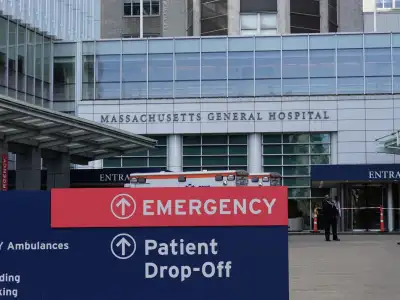Massachusetts Is Under Economic Attack
The ‘eds and meds’ sectors that fuel the state’s economy are facing grave danger from Trump administration policies

THE TRUMP ADMINISTRATION is waging economic warfare against Massachusetts by turning political points into lethal policies that weaken several of our pillar industries: higher education, life sciences, maritime trade, and tourism. These industries account for about one-third of the state’s gross domestic product.
Recently, I completed a study assessing the near and longer-term impact of these actions on state economic growth, jobs and tax revenue collection. The study confirmed that Massachusetts is disproportionately affected by the policy trifecta — deep cuts in federal funding, high trade tariffs, and immigration crackdowns. Collectively, these policies are a giant wrecking ball to the state’s economy.
Start with the White House’s federal spending cuts. At the center of Massachusetts’s knowledge-based economy is higher education and life sciences, accounting for almost 20 percent of GDP. The state is the third largest recipient of National Institutes of Health funding, totaling $3.5 billion annually, spread out over 6,000 grants and 220 recipients. Grant recipients include colleges, universities, medical centers, and research institutions. Mass General Brigham is at the top of the list, garnering over $655 million.
Federal funding strengthens the state’s “eds and meds” economy, fueling biotech, drug discovery, and innovation. This funding supports over 140,000 jobs, generating spinoff technologies and startups, creating even more jobs — a multiplier effect that, at 2.5 times, swells the yearly economic benefit to $9 billion. Deep NIH cuts in 2026 could reduce economic activity by $1.4 to $2.2 billion, with a loss of 14,000 jobs. If cuts persist, losses could reach 64,000 by 2028. The higher-skilled brain drain has started as scientists and researchers relocate to countries that provide better biotech-friendly opportunities. These cuts, if not stopped, could eventually undermine the state’s dominant position in life sciences.
Trade is also an important driver, accounting for over 9 percent of the state’s economic activity. Massachusetts trades over $62 billion in goods annually, with Canada, China, and Mexico its largest trading partners. Having a trading surplus, Massachusetts sells more goods than it buys. Typical exports include medical devices, high-tech instruments, and pharmaceuticals. Purchases include gasoline, motor vehicles, lumber and electricity.
Tariffs have proven to be a destructive economic policy, fueling higher costs, damaging market confidence, spending and shrinking trade. By 2026, tariff hikes could erase $12.8 billion in state economic growth, almost $1 billion in tax revenue, and up to 79,000 jobs.
If not lessened, the “tariff war” could also become a transmission mechanism for the next recession. In an ominous sign, US first quarter GDP declined. Should this trend persist, the nation could hit full recession by June, and Massachusetts would follow. If a recession occurs, economic losses to the state could double.
The immigrant population, totaling 1.4 million people, is vital to the Massachusetts economy. Foreign-born residents account for 20 percent of the state’s population, 23 percent of the labor force, and 25 percent of entrepreneurs. The state ranks fifth in the nation in percentage of foreign-born residents, even above Texas.
Foreign-born workers support the lower-end service industries and highest value-add STEM industries. Annual state and local taxes paid by immigrants top $7 billion. The undocumented immigrant workforce of 400,000 is concentrated in several industries including construction, food services, manufacturing, and health care.
An immigration crackdown will also shrink the flow of legal immigrants needed to fill job openings and spur future economic growth. Last year, Massachusetts’s labor supply growth was generated entirely by incoming immigrants. Given the state’s low unemployment rates, even a modest reduction in the immigrant workforce would lead to a significant labor shortage. In 2026, tighter immigration policies could cost the state up to $3.9 billion in lost spending, $481 million in lost tax revenue, and 45,000 fewer workers, over 4,000 of whom are entrepreneurs.
Government policies can also have damaging ripple effects. Last year, 82,000 international students enrolled in our higher education institutions, spending $3.9 billion and supporting about 36,000 jobs. Travel bans, visa cancelations, student deportations, and threats to block foreign students from universities have elevated fear and anxiety. Unfriendly immigration policies could dampen international student enrollments and financially harm area colleges and universities.
Northeastern University, Boston University, Harvard, MIT, and UMass Amherst top the list with the highest concentration of international students. On a statewide basis, a 10 percent enrollment decline could cost higher education $390 million annually.
Anti-immigration policies could also harm the state’s vibrant $24 billion tourist industry, which accounts for almost 4 percent of GDP. Each year, over 50 million people visit the Bay State, over 2.1 million of whom are foreign visitors. A 30 percent drop in foreign visitors would cost over $1 billion through 2028.
In response to this economic attack, Massachusetts should plan and respond aggressively. Gov. Healey’s recently announced state hiring freeze is a good first step. But other actions need to be taken. The governor’s office should gain valuable stakeholder input and create a detailed “Mass. Strong” action plan.
Similar to under Covid, given the current extent of economic uncertainty, for the FY 2026 budget, state legislators should refrain from adopting a full-year budget and endorse month-to-month spending plans until the full impact of White House moves is clearer. Stress-testing must be part of the budgeting process, including analysis of how the state would handle moderate to severe reductions in federal Medicaid reimbursement.
Legal challenges against Trump administration orders should also be intensified; doing so will throw sand in the works, reducing policy harm. To magnify the state’s legal punch, greater funds than previously proposed by the House should be allocated to the attorney general
To protect the state’s leadership in life sciences and counter lost NIH funding, a public-private partnership applying a venture capital model approach should be created. Massachusetts also needs to protect its labor force supply and assert itself as a welcoming and safe place for immigrants to live, work, and study. Lastly, a targeted campaign to encourage foreign tourists to visit the Bay State should also be undertaken. Doing so will help, reduce the economic blow of Trump anti-immigration policies.
Responding to the economic threat in a planned, coordinated, and timely manner will also help Massachusetts better prepare for the economic uncertainty and wobbly economy that is most likely ahead.

Mark Williams is a finance professor at Boston University’s Questrom School of Business and past president of the Boston Economic Club
